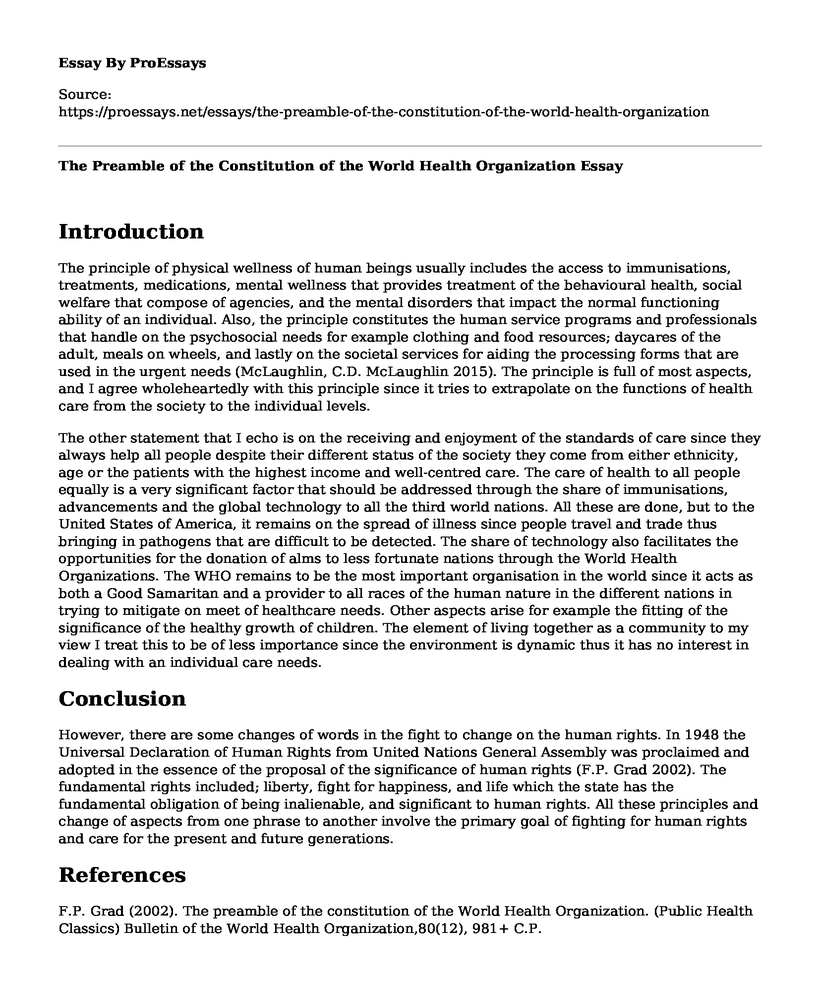Introduction
The principle of physical wellness of human beings usually includes the access to immunisations, treatments, medications, mental wellness that provides treatment of the behavioural health, social welfare that compose of agencies, and the mental disorders that impact the normal functioning ability of an individual. Also, the principle constitutes the human service programs and professionals that handle on the psychosocial needs for example clothing and food resources; daycares of the adult, meals on wheels, and lastly on the societal services for aiding the processing forms that are used in the urgent needs (McLaughlin, C.D. McLaughlin 2015). The principle is full of most aspects, and I agree wholeheartedly with this principle since it tries to extrapolate on the functions of health care from the society to the individual levels.
The other statement that I echo is on the receiving and enjoyment of the standards of care since they always help all people despite their different status of the society they come from either ethnicity, age or the patients with the highest income and well-centred care. The care of health to all people equally is a very significant factor that should be addressed through the share of immunisations, advancements and the global technology to all the third world nations. All these are done, but to the United States of America, it remains on the spread of illness since people travel and trade thus bringing in pathogens that are difficult to be detected. The share of technology also facilitates the opportunities for the donation of alms to less fortunate nations through the World Health Organizations. The WHO remains to be the most important organisation in the world since it acts as both a Good Samaritan and a provider to all races of the human nature in the different nations in trying to mitigate on meet of healthcare needs. Other aspects arise for example the fitting of the significance of the healthy growth of children. The element of living together as a community to my view I treat this to be of less importance since the environment is dynamic thus it has no interest in dealing with an individual care needs.
Conclusion
However, there are some changes of words in the fight to change on the human rights. In 1948 the Universal Declaration of Human Rights from United Nations General Assembly was proclaimed and adopted in the essence of the proposal of the significance of human rights (F.P. Grad 2002). The fundamental rights included; liberty, fight for happiness, and life which the state has the fundamental obligation of being inalienable, and significant to human rights. All these principles and change of aspects from one phrase to another involve the primary goal of fighting for human rights and care for the present and future generations.
References
F.P. Grad (2002). The preamble of the constitution of the World Health Organization. (Public Health Classics) Bulletin of the World Health Organization,80(12), 981+ C.P.
McLaughlin, C.D. McLaughlin (2015). Health Policy Analysis. An interdisciplinary approach 2nd ed. Jones and Bartlett Learning.
Cite this page
The Preamble of the Constitution of the World Health Organization. (2022, Jul 07). Retrieved from https://proessays.net/essays/the-preamble-of-the-constitution-of-the-world-health-organization
If you are the original author of this essay and no longer wish to have it published on the ProEssays website, please click below to request its removal:
- Vascular Dementia with Mood Disorder
- Autophagy-Related Protein Expression Paper Example
- Research Paper on Respiratory Infections
- Equipoise in Research - Essay Sample
- Coronavirus Crisis: US Government Slow to Respond Despite Wartime Measures - Essay Sample
- Level of Anxiety in Students and Education System Due to COVID 19 - Essay Sample
- Paper Example on End-of-Life Preparedness: Acceptance, Orientation, and Aptitudes







